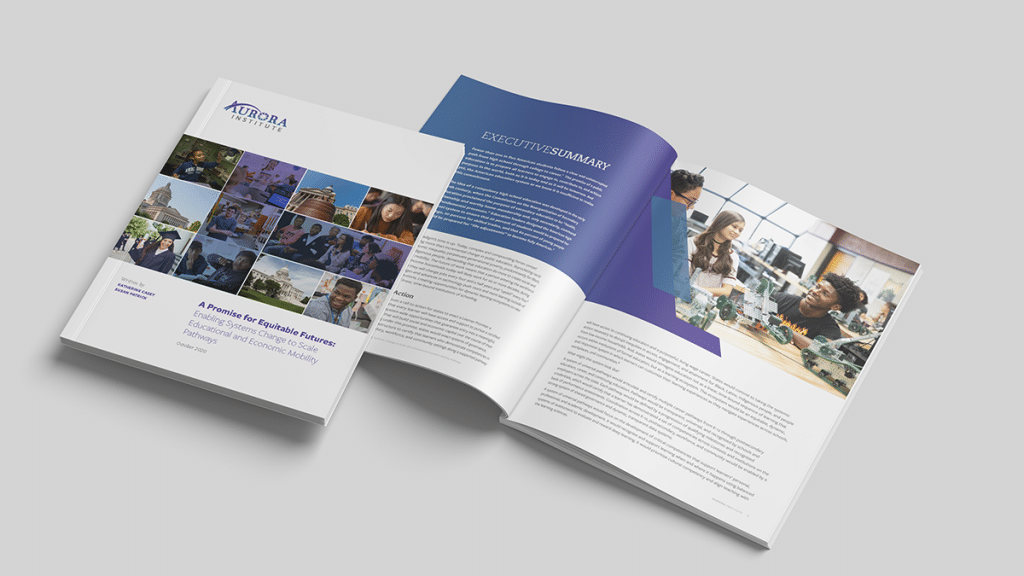Press Release
Aurora Institute Calls on State Leaders to Commit to a Learner Promise to Ensure Equity for All
WASHINGTON, D.C., Oct. 26, 2020—The Aurora Institute (@Aurora_Inst) today released A Promise for Equitable Futures: Enabling Systems Change to Scale Educational and Economic Mobility Pathways, a book that calls for the systematic dismantling of the traditional time- and place-bound structures that mark our current K-12 education system.
In its place, states would build systems of governance, policy, and infrastructure to certify that learners who demonstrate competencies in K-12, postsecondary, workforce, and community settings will have access to continuing education and a purposeful, living-wage career.
The book urges states to establish a “Learner Promise,” a commitment that every learner will have access and support to pursue a certified pathway with system-wide opportunities that guarantee entry into a meaningful, chosen career that will build social and economic capital over the course of their lives. In addition, states would commit to taking the systemic action to specifically disrupt inequities in access, engagement, and attainment for Black, Latinx, Indigenous people, and people from low-income households.
Moreover, states would let go of the notion that education should be a linear, time-bound sequence of learning that occurs within institutions of formal education. Rather, K-12 education can be reimagined as a “learning ecosystem.” A more aligned, coherent ecosystem would be an equitable, dynamic, and responsive system in which learners can customize their learning experiences.
“As a nation, we have been taught to believe in a story that goes like this: success in college is the way to a good job. Success in high school is the way to a good college, and schools are equalizers where motivated, capable youth can achieve mobility along a certain and certified path,” said author Katherine Casey. “The problem with this story is that it is not true.”
Co-author Susan Patrick, President and CEO of the Aurora Institute, asks, “How can we scale innovations with supportive policies and practices? A Promise for Equitable Futures is a call to action for states with policy recommendations to create aligned, coherent competency-based education and workforce development systems throughout K-12 education, postsecondary, and the workforce. It challenges policy leaders to fundamentally rethink the structure and design of education systems and makes a collective call to develop new equity-driven ecosystems for lifelong learning in the United States.”
The siloed, factory-model of today’s education system was designed more than 100 years ago to send some young people to college, send some to the trades, and to assimilate the rest into a dominant culture. Today, the evolving realities of work and learning demand that all learners receive some postsecondary education. It’s also clear that a four-year degree is not the sole pathway to social and economic mobility. The incredible costs of increasing inequality on our world make the inequitable outcomes of our current education system intolerable.
State leaders — governors, legislators, and executives — have significant power and leverage to create the conditions in which universal pathways systems can be developed. A Promise for Equitable Futures makes 14 recommendations for action. They include:
- Organize and coordinate state-level and regional pathways by creating shared governance structures.
- Streamline and align planning, funding, and accountability to support cooperative action across sectors.
- Develop integrated, transparent, and learner-centered data systems, including a universal learner record, to support cross-sector coordination and empower learner agency.
- Build a knowledge-sharing ecosystem by facilitating structures for shared learning, improvement, and sense-making.
- Stimulate innovation and create incentives that can help regions develop and oversee pathway systems.
- Build infrastructure that enables continuity of learning from K-12 through employment.
- Enable anywhere anytime learning.
- Redesign curriculum and assessment to support universal pathways.
- Invest in innovative, robust, and relevant systems of learner development and advisement.
- Support and scale innovative approaches to school and program design.
- Support and scale innovations that modernize and diversify and prepare the teacher workforce.
- Engage diverse stakeholders to share stories and experiences.
- Invest in research, learning, and engagement efforts that build knowledge, will, and collective capacity to create universal pathways.
- Advocate for policy and systemic solutions that will promote social and economic equity.
Download and share the report.
About Aurora Institute
 Aurora’s mission is to drive the transformation of education systems and accelerate the advancement of breakthrough policies and practices to ensure high-quality learning for all. Aurora is shaping the future of teaching and learning for more than 14 million students through its work in policy advocacy, research, and field-building/convening. We work on systems change in K-12 education, identify root causes, promote best practices, examine policy barriers, and make recommendations for change. Aurora has a national and global view of education innovation and lifts up promising policies and practices that yield improved outcomes for students. Aurora envisions a world where all people are empowered to attain the knowledge, skills, and dispositions necessary to achieve success, contribute to their communities, and advance society.
Aurora’s mission is to drive the transformation of education systems and accelerate the advancement of breakthrough policies and practices to ensure high-quality learning for all. Aurora is shaping the future of teaching and learning for more than 14 million students through its work in policy advocacy, research, and field-building/convening. We work on systems change in K-12 education, identify root causes, promote best practices, examine policy barriers, and make recommendations for change. Aurora has a national and global view of education innovation and lifts up promising policies and practices that yield improved outcomes for students. Aurora envisions a world where all people are empowered to attain the knowledge, skills, and dispositions necessary to achieve success, contribute to their communities, and advance society.
